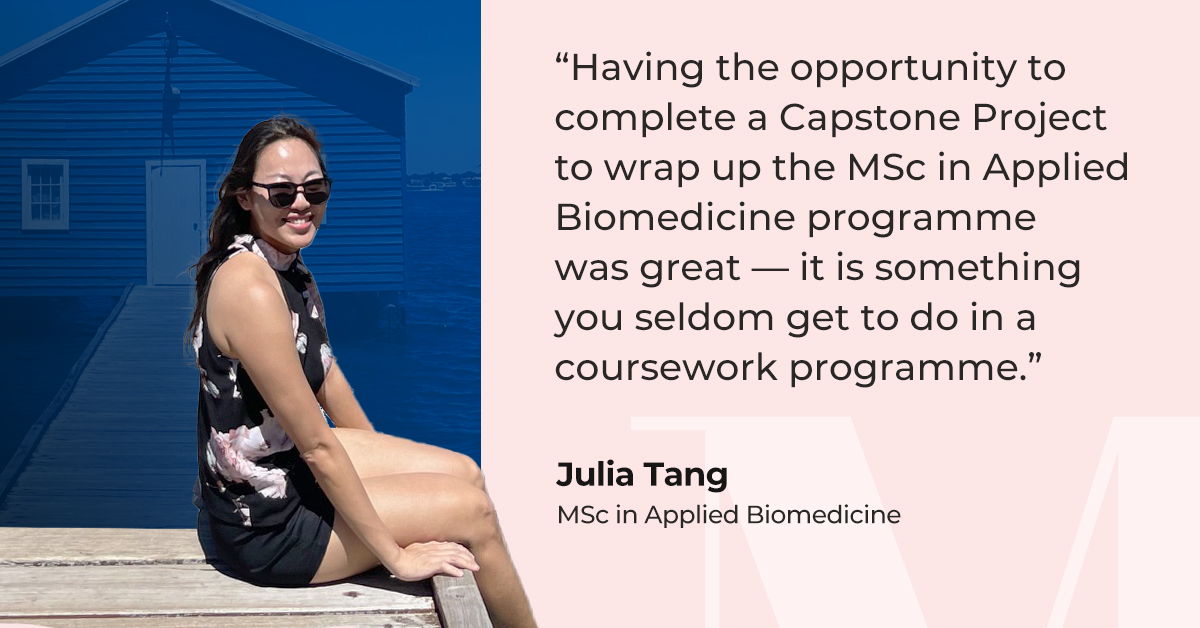Julia Tang recently marked a decade and a half working in the field of microbiology. With a career that has taken her to various aspects of the industry, from a commercial laboratory to the manufacturing floor of a biomedical production facility, as well as a list of professional qualifications that include the Sigma Six Green Belt and ISO internal auditor certifications, one would think she has built up an impressive enough set of skills and knowledge for her to boast about.
However, she could not shake the thought that there was more she could do to develop her skills and advance her career. It eventually drove her to enrol in the National University of Singapore (NUS) Master of Science (MSc) in Applied Biomedicine programme.
She chose the programme as she felt it would allow her to understand her work better. “It equipped me with in-depth and up-to-date specialist knowledge and gave me a better understanding of the technologies employed in the field of biomedicine,” she noted. “The programme covered the way technology worked, treatment and therapy methods as well as delivery to patients — all presented in a clear manner.”
While MSc in Applied Biomedicine programme allows learners to gain exposure across a wide array of sub-topics by generalising, it also gives them the option to choose among three specialisations: Vaccinology and Immunotherapy, Infectious Diseases Management, and Drug Discovery and Development. Julia decided to focus on Vaccinology and Immunotherapy, as it enabled her to fill in her knowledge gaps.
“I already had a firm grasp of the manufacturing industrial aspect,” she shared, “and with the MSc in Applied Biomedicine programme, I was able to build up my knowledge of immunology.”
Juggling a career and studies is no easy task though, and Julia felt the pressure to excel in both. She credited a piece of advice from one of her lecturers with helping her to find a way to manage her energy and expectations.

“Professor Liu Haiyan mentioned in one of her classes that the purpose of our studies was to deepen our understanding as well as broaden our knowledge, not to pursue high grades.”
Taking her professor’s words to heart, she approached her work and studies with a fresh mindset and renewed vigour.
Of all the courses she has taken under the programme, Julia singled out ABM5101 Applied Immunology as one that she has quite enjoyed. The course, which covers fundamental concepts in immunology that are central for innovations in the design and implementation of immunological techniques, has helped her better grasp the important role that advanced immunological applications play in various healthcare-related industries.
“Being able to gain a deeper understanding of biomedicine through this programme has been extremely beneficial to my professional growth,” Julia noted, who recently joined Sanofi Modulus Singapore, under the position of Expert II, Quality Technical Service.
“Furthermore, having the opportunity to complete a Capstone Project to wrap up the MSc in Applied Biomedicine experience was great — I think it is something you seldom get to do in a coursework programme.”
So, does graduating from the programme also mark the end of her studies? Julia laughed in response to the question, pointing out that she sees lifelong learning as being an essential part of growth and development. Nonetheless, her postgraduate studies have certainly helped her achieve her goal of becoming more well-versed in her chosen field of work. “With the completion of the MSc in Applied Biomedicine programme, I see myself a step closer to becoming a subject matter expert,” she said proudly.
To learn more about the MSc in Applied Biomedicine programme, visit the programme page.
